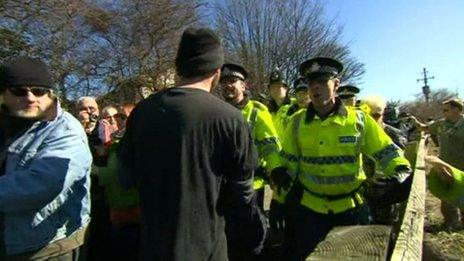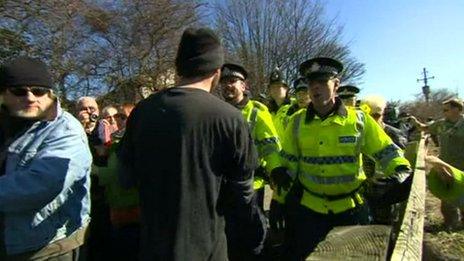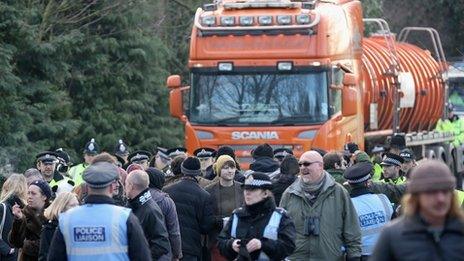Fracking protest levy call by Greater Manchester police chief
- Published

Mr Lloyd has already called on the government to bear some of the £1.6m his force will spend policing protests
Shale gas exploration firms should pay a levy towards the cost of policing anti-fracking protests, Greater Manchester's Police and Crime Commissioner says.
Tony Lloyd said firms stand to make "huge sums of money" out of their work.
"Since they'll be making big bucks, they [should] put something back into the kitty," he said.
Ken Cronin, of the UK Onshore Operators Group (UKOOG), said a levy would set a "worrying precedent".
'Taxed at 62%'
The chief executive of UKOOG, a representative body for the UK onshore oil and gas industry, said it would constitute paying the costs of police protection from individuals who were preventing them going about their lawful and permitted business.
He said: "Like all business sectors the onshore oil and gas industry pays tax and in the case of onshore oil and gas this is currently set at 62%.
"In addition, the industry has agreed with government that all business rates generated will go to local councils and that communities around sites could earn up to £10m over the lifetime of a site."
About 60 people have been camped on land near a site in Barton Moss, Salford where energy company IGas started testing for the presence of shale gas in November.
Mr Lloyd has already called on the government to bear some of the £1.6m his force will spend policing the protests.
'Inevitable protests'
"We don't think this is unreasonable, particularly since central government has made clear that fracking is a priority for them in coming years," he said.
"It seems unfair that police locally have to foot the bill for the inevitable protests that follow."
Hydraulic fracturing or fracking involves pumping a mixture of water and chemicals into shale rock at high pressure to extract gas and oil.
Environmental campaigners claim the process encourages reliance on fossil fuels instead of promoting investment in renewable energy sources.
Proponents of the process say it unlocks huge deposits of oil and natural gas, increases a country's energy security and boosts the economies of the areas in which it takes place.
- Published11 March 2014

- Published10 March 2014
